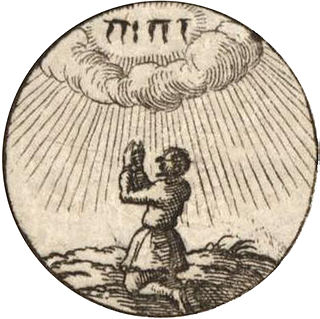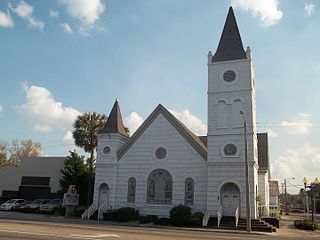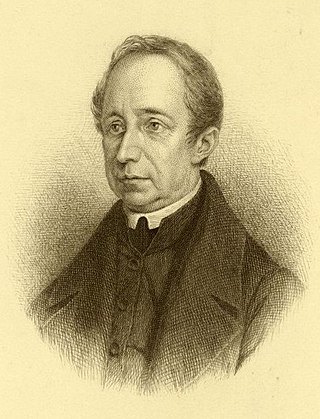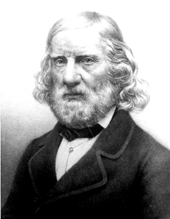This article includes a list of references, related reading, or external links, but its sources remain unclear because it lacks inline citations .(July 2014) |
The Friends of the Light was an association of German rationalists.
This article includes a list of references, related reading, or external links, but its sources remain unclear because it lacks inline citations .(July 2014) |
The Friends of the Light was an association of German rationalists.
It originated in the Province of Saxony, in 1841. The members were also called Protestant Friends. The immediate occasion was an attempt to discipline a Magdeburg preacher who had expressed heretical views. Early leaders in the movement were Leberecht Uhlich and Gustav Adolf Wislicenus, both of whom were forced out of the Evangelical Church for expressing liberal views. In like manner, independent congregations arose in a number of places. In 1847, a union was effected between them on the basis of a simple profession of faith in God and called Free Congregations (Ger. freie Gemeinden). By this time their gatherings, held symbolically in the open air, had come to number more than two thousand, including delegates from England and America.
In 1850, they united with the German Catholics, and in the same year and the years immediately following some forty congregations were established in the United States, but had a short existence. After the Revolutions of 1848, several of the German governments undertook to suppress them, partly for political reasons. Many congregations were broken up. Those still in existence in 1859, about fifty in number, under Uhlich's leadership, formed a “Union of Free Congregations in Germany,” upon a highly rationalistic basis. Inasmuch as the fullest individual liberty was allowed, the belief of members and congregations varied greatly. There was a tendency toward radical free thought, and some even denied the existence of a personal God. The association was strongest in Berlin, Breslau, and Magdeburg. Its numbers and influence gradually diminished. It was superseded by the Old Catholic Church.
Baptists form a major branch of evangelicalism distinguished by baptizing only professing Christian believers and doing so by complete immersion. Baptist churches generally subscribe to the doctrines of soul competency, sola fide, sola scriptura and congregationalist church government. Baptists generally recognize two ordinances: baptism and communion.
Unitarianism is a nontrinitarian branch of Christianity. Unitarian Christians affirm the unitary nature of God as the singular and unique creator of the universe, believe that Jesus Christ was inspired by God in his moral teachings and that he is the savior of humankind, but he is not equal to God himself.

The priesthood of all believers is either the general Christian belief that all Christians form a common priesthood, or, alternatively, the specific Protestant belief that this universal priesthood precludes the ministerial priesthood found in some other churches, including Catholicism and Eastern Orthodoxy.
The Evangelical Lutheran Church in America (ELCA) is a mainline Protestant Lutheran church headquartered in Chicago, Illinois. The ELCA was officially formed on January 1, 1988, by the merging of three Lutheran church bodies. As of 2022, it has approximately 2.9 million baptized members in 8,640 congregations.

The United Church of Canada is a mainline Protestant denomination that is the largest Protestant Christian denomination in Canada and the second largest Canadian Christian denomination after the Catholic Church in Canada.

The United Church of Christ (UCC) is a socially liberal mainline Protestant Christian denomination based in the United States, with historical and confessional roots in the Congregational, Restorationist, Continental Reformed, and Lutheran traditions, and with approximately 4,600 churches and 712,000 members. The UCC is a historical continuation of the General Council of Congregational Christian churches founded under the influence of New England Puritanism. Moreover, it also subsumed the third largest Calvinist group in the country, the German Reformed. Notably, its modern members' theological and socio-political stances are often very different from those of its predecessors.

Closed communion is the practice of restricting the serving of the elements of Holy Communion to those who are members in good standing of a particular church, denomination, sect, or congregation. Though the meaning of the term varies slightly in different Christian theological traditions, it generally means that a church or denomination limits participation either to members of their own church, members of their own denomination, or members of some specific class. This restriction is based on various parameters, one of which is baptism. See also intercommunion.

Open communion is the practice of some Protestant Churches of allowing members and non-members to receive the Eucharist. Many but not all churches that practice open communion require that the person receiving communion be a baptized Christian, and other requirements may apply as well. In Methodism, open communion is referred to as the open table, meaning that all may approach the Communion table.
The German Catholics were formed in December 1844 by German dissidents from the Roman Catholic Church, under the leadership of Johannes Ronge. The movement originated in Breslau. They were joined for a time by somewhat more conservative dissidents under the leadership of Johannes Czerski. This latter movement took the name of Christian Catholics and originated in Schneidemühl.

The New Apostolic Church (NAC) is a Christian church that split from the Catholic Apostolic Church during an 1863 schism in Hamburg, Germany.
A spiritualist church is a church affiliated with the informal spiritualist movement which began in the United States in the 1840s. Spiritualist churches exist around the world, but are most common in English-speaking countries, while in Latin America, Central America, Caribbean and Sub-Saharan Africa, where a form of spiritualism called spiritism is more popular, meetings are held in spiritist centres, most of which are non-profit organizations rather than ecclesiastical bodies.

The black church is the faith and body of Christian denominations and congregations in the United States that predominantly minister to, and are also led by African Americans, as well as these churches' collective traditions and members. The term "black church" may also refer to individual congregations, including in traditionally white-led denominations.

Anton Günther was an Austrian Roman Catholic philosopher whose work was condemned by the church as heretical tritheism. His work has been described as Liberal Catholicism and Vienna's first Catholic political movement. His writings made him a leader among the generation of German Catholic theologians who emerged from the Romantic movement.
Unitarianism, as a Christian denominational family of churches, was first defined in Poland-Lithuania and Transylvania in the late 16th century. It was then further developed in England and America until the early 19th century, although theological ancestors are to be found as far back as the early days of Christianity. It matured and reached its classical form in the middle 19th century. Later historical development has been diverse in different countries.

Christoph Joseph Rudolf Dulon was a pastor of the Reformed Church (Calvinist) and a socialist agitator in Bremen; later he was an educator in the United States.
Lutheranism is a major branch of Protestantism that identifies primarily with the theology of Martin Luther, the 16th-century German monk and reformer whose efforts to reform the theology and practices of the Catholic Church ended the Middle Ages and, in 1517, launched the Reformation.

Leberecht Uhlich (1799–1872) was a German clergyman and one of the founders of the German Free Congregations.

The Swedish Pentecostal Movement is a Pentecostal movement in Sweden. Many, but not all, of these, are members of the Pentecostal Alliance of Independent Churches, which was founded in 2001. The Pentecostal movement spread to Sweden by 1907 from the 1904–1905 Welsh Revival and the Azusa Street Revival in Los Angeles in 1906.